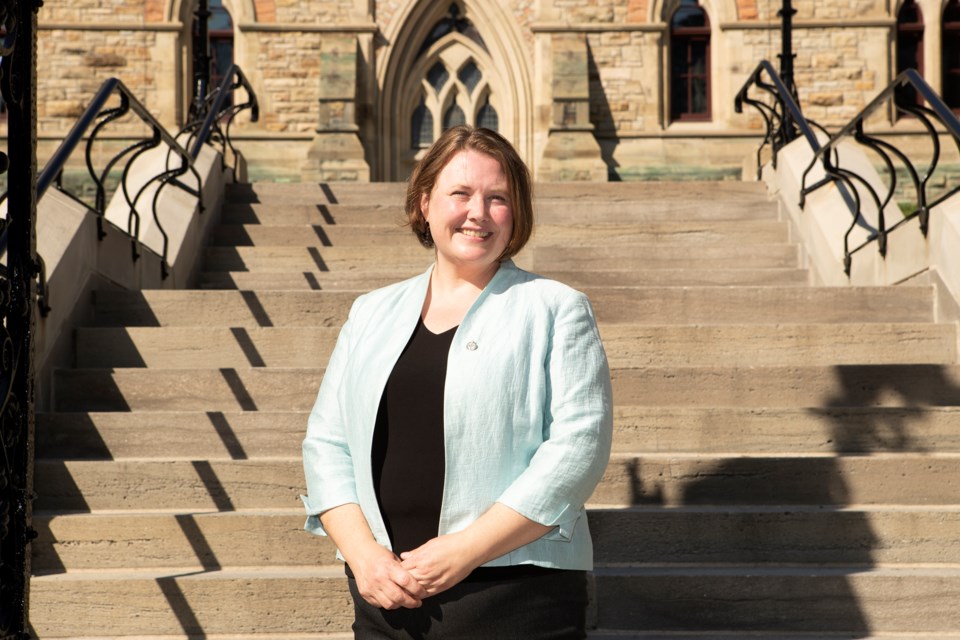Canada’s parliament session has ended and North Island-Powell River MP Rachel Blaney, reflecting back, indicated a number of important issues came to the fore during the discussions.
Blaney, in town for the Powell River Logger Sports event, said the highlight of this session for her was the study being conducted on women military veterans.
“I’ve just been overwhelmed by how many women veterans are coming forward from across Canada and asking to be part of the study, seeing that kind of motivation,” said Blaney. “Then, seeing so many women veterans showing up at the committee meetings to support the women veterans who are testifying, I’ve really been moved.
“When you see that kind of response, it really lets you know, there’s something important happening here that needs to be dealt with.”
Blaney started a parliamentary study looking into health care matters concerning women in the Canadian Armed Forces.
“Those stories are sometimes very hard to hear, but I’m excited about the fall, finishing up that report and getting some recommendations to the federal government. It’s going to be quite important, especially since it’s the first time this has ever been studied in parliament.”
Weather stations
Another project Blaney has been working on is the fact that there are so many weather stations not functioning on the BC coast.
“That provides very little information for people who are either working on the water or flying over the water,” said Blaney. “Safety matters, and knowing not only what the weather is you’re going into, but what’s going to come around in the near future, is so important. We're working hard, filling out a lot of petitions. I found a lot of constituents really passionate about this issue.”
Health care
While more provincial in scope, Blaney said she has been hearing a lot of concern surrounding health care.
“I just keep hearing about folks not able to find a family doctor and people really worried about having their health care services provided to them in a timely fashion,” said Blaney. “We’ve had a lot of conversations about how the federal government needs to pick up a little bit more and see some more resources coming to communities, and maybe some communities targeted specifically because their needs are so high.”
Blaney said it would be good to see the federal government step up on a few things related to health care. One is to provide more resources to provinces, targeting smaller communities. She said the federal government also has a role to play in the immigration process that allows assessing skill sets that come into the country, such as medical personnel.
“It’s disappointing when you’re jumping into a taxi somewhere or talking to somebody who’s working a job, and you find out in their home country, they were in health care system, they were a doctor, they were surgeon, and here they are in our country, helping build our country, but not being able to use those skills,” said Blaney. “It would be so important to see the federal government take some leadership to work with provincial governments and territorial governments to figure out the system.
“The challenge, of course, is that a lot of our systems are based on the province deciding what those requirements are and how to measure them. We need to see the federal government step up and provide some support so we can have those discussions in a more meaningful way.”
Housing market
In terms of housing, the NDP continues to work with and push the government to get projects up and running, said Blaney.
“Here’s the reality – we’re so far behind in housing, that catching up is so hard,” said Blaney. “One of the things that I’m passionate about is I’ve put forward a motion more than once in different parliaments to have housing recognized as a right for Canadians in the Canadian Bill of Rights. The reason we want housing founded in the bill of rights, is so the federal government has some accountability to watch what’s happening.”
Blaney said, looking at statistics, in the late 1990s, the federal government stopped moving money through Canada Mortgage and Housing Corporation to build housing to the tune of about 15,000 to 20,000 units a year.
“If you look at the need now, and what we’re hearing across Canada, it looks like 500,000 units are needed, just to start to catch up,” said Blaney. “It’s disappointing to not see that ongoing funding to really target low-income housing, social housing, supportive housing and co-op housing.
“There are great models out there that we could be seeing, and we’re just seeing the federal government contribute, but not nearly enough. So, the right to housing being in the bill of rights would mean the federal government had to watch that ball.”
Blaney said young people cannot get into the housing market today.
“It's incredibly expensive,” said Blaney. “Right now, we’re seeing one-bedroom apartments for $1,500. That is not affordable. “We’ve seen the provincial government step up with money for housing, but the federal government is not a meaningful partner. We know what happens to our community when people have nowhere to live. It’s very detrimental.”



